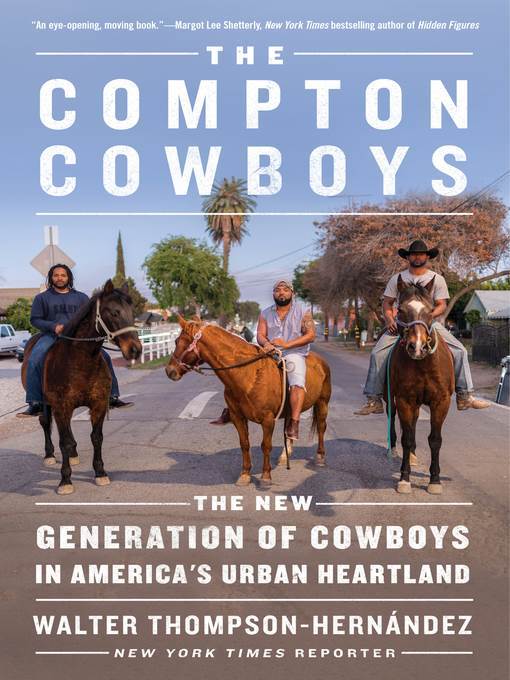
The Compton Cowboys
The New Generation of Cowboys in America's Urban Heartland
فرمت کتاب
ebook
تاریخ انتشار
2020
نویسنده
Walter Thompson-Hernandezناشر
William Morrowشابک
9780062910622
- اطلاعات
- نقد و بررسی
- دیدگاه کاربران
نقد و بررسی

February 15, 2020
A year in the lives of 10 inner-city men fighting to keep black cowboy culture alive and well even as their personal lives are in disarray. By the time New York Times reporter Thompson-Hernández caught up with them, the Los Angeles-based Compton Cowboys seemed to be experiencing a wishful and elegiac pall. The equine outpost, which had always served as refuge and home away from home throughout the crew's often tumultuous and traumatized childhoods, was in dire straits. Mayisha Akbar, the indomitable force of nature who founded the Compton Junior Posse in 1988, was heading toward retirement, and the big-money donors that had kept the expensive operation afloat were slowly disappearing. The mantle of ranch leadership was about to shift to Randy, Mayisha's nephew. While Randy understood what was required to allow the group to blaze a new trail into the future, the stakes were high: keeping alive the legacy and heritage of men like Nat Love and Bill Pickett, real-life black cowboys who, despite Hollywood's whitewashing of history, were integral in establishing what became known as the Wild West. However, regardless of their determination to pass down the black cowboy tradition to the next generation of new riders, the CJP members had to cope with the daily realities of life on the gang-scarred streets of Compton. In his intimate yet sober-eyed narrative, Thompson-Hernández never shies away from those realities. All of the Compton Cowboys, to some degree, have struggled with the PTSD associated with the neighborhood's dangerous landscape. Across the board, there continues to be unresolved anger and alcoholism, self-doubt and trepidation. Describing Mayisha's retirement party, the author writes, "the future of the ranch was uncertain and everyone in attendance looked at the cowboys for answers that they did not have." The author's fondness and respect for the CJP crew is consistently patent (only occasionally overly so), and he tells their story straight, no matter how much it hurts. A gritty and somber chronicle of an often overlooked community.
COPYRIGHT(2020) Kirkus Reviews, ALL RIGHTS RESERVED.

March 1, 2020
New York Times writer Thompson-Hernandez chronicles the fading legacy of the Black cowboys of Compton, California, in thoughtful and compassionate style. In 1988, real estate agent Mayisha Akbar founded Richland Farms, the site of one of the first Black cowboy ranches in the U.S., in order to keep young kids off the streets and out of gangs by providing opportunities to care for and ride horses. Three decades later, Akbar is retiring, and those boys are now men. Akbar's nephew Randy is poised to take over the ranch, but funds have run dry, and, while people still love seeing the Compton Cowboys, children no longer seem interested in joining themselves. While the ranch has been a saving grace for the 10 men still riding, they've also experienced violence and pain at the hands of the neighborhood and suffer consequences like PTSD and alcoholism. Thompson-Hernandez never shies away from the cowboys' trauma, and his respect for them is clear. This is an endearing tribute to them, Akbar, and the benefits of equine therapy.(Reprinted with permission of Booklist, copyright 2020, American Library Association.)

November 1, 2019
A fellow with Surfing, a multimedia division of the New York Times investigating underrepresented communities worldwide, Thompson-Hernandez wrote a piece on the Compton Cowboys that was among the paper's most popular stories in 2018. These urban equestrians, black men and women continuing the long-standing tradition of black cowboys in the midst of a troubled city, got their start when Mayisha Akbar founded the Compton Jr. Posse in 1988 to afford local youth a place of camaraderie, healing, and safety. Thompson-Hernandez shows how the next generation is moving forward while fighting to keep their ranch open. With a 100,000-copy first printing and optioned for film.
Copyright 2019 Library Journal, LLC Used with permission.




دیدگاه کاربران